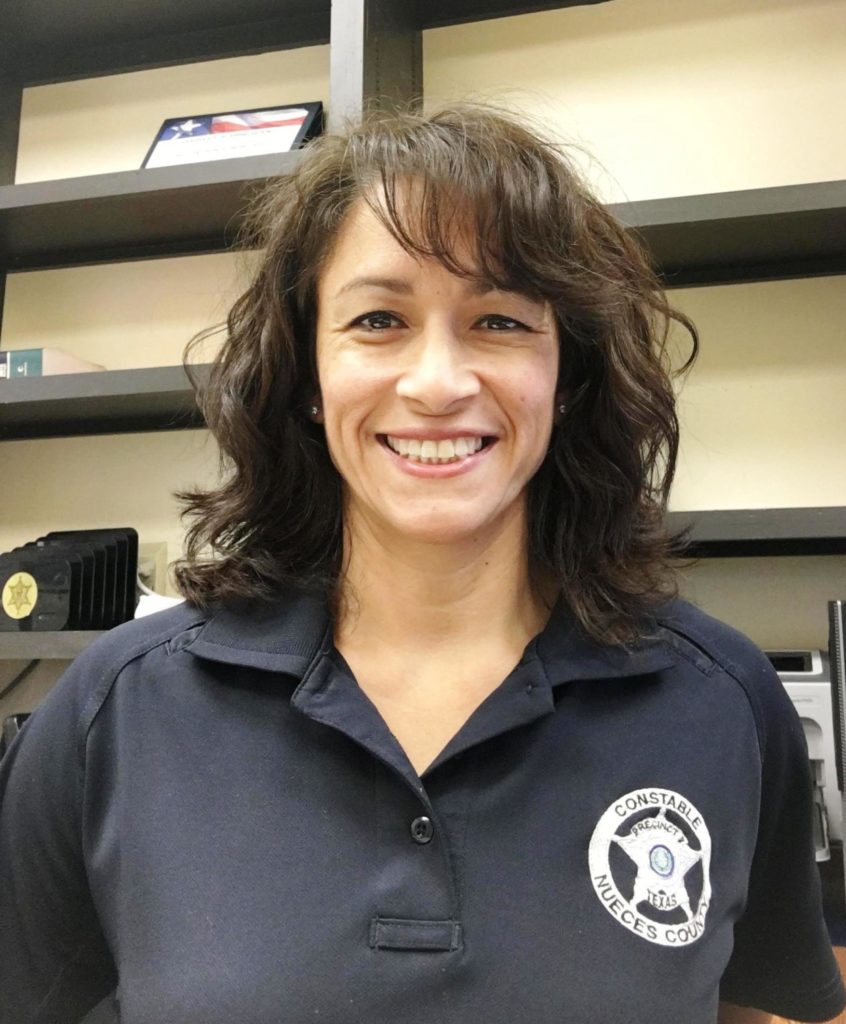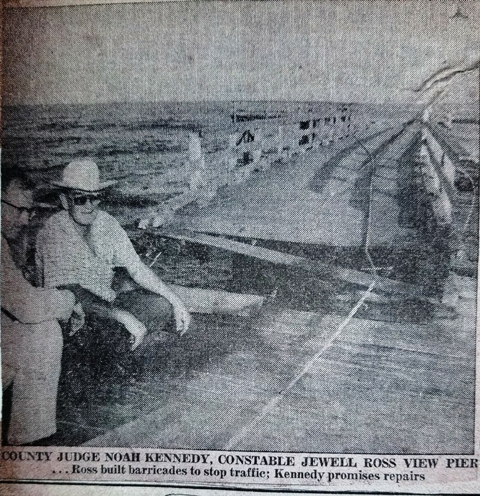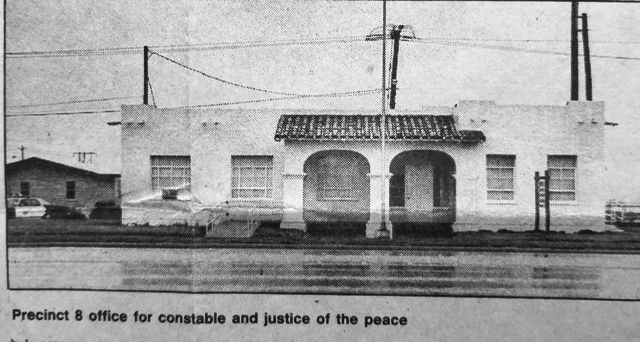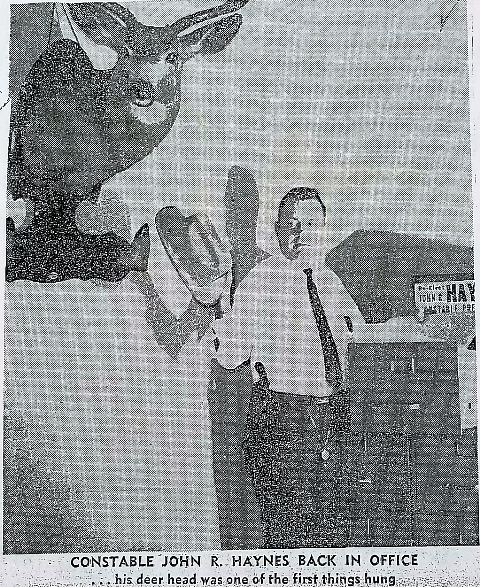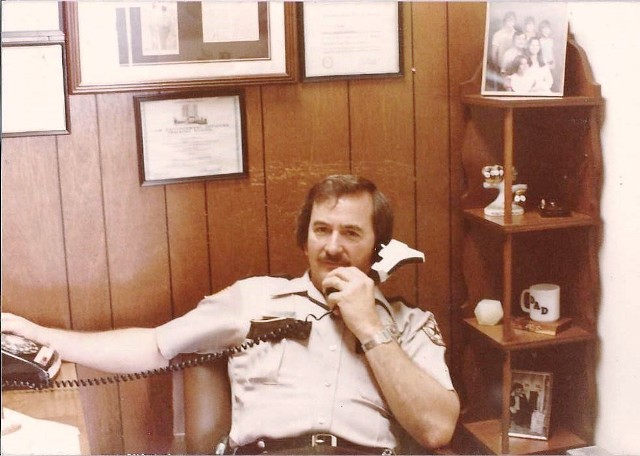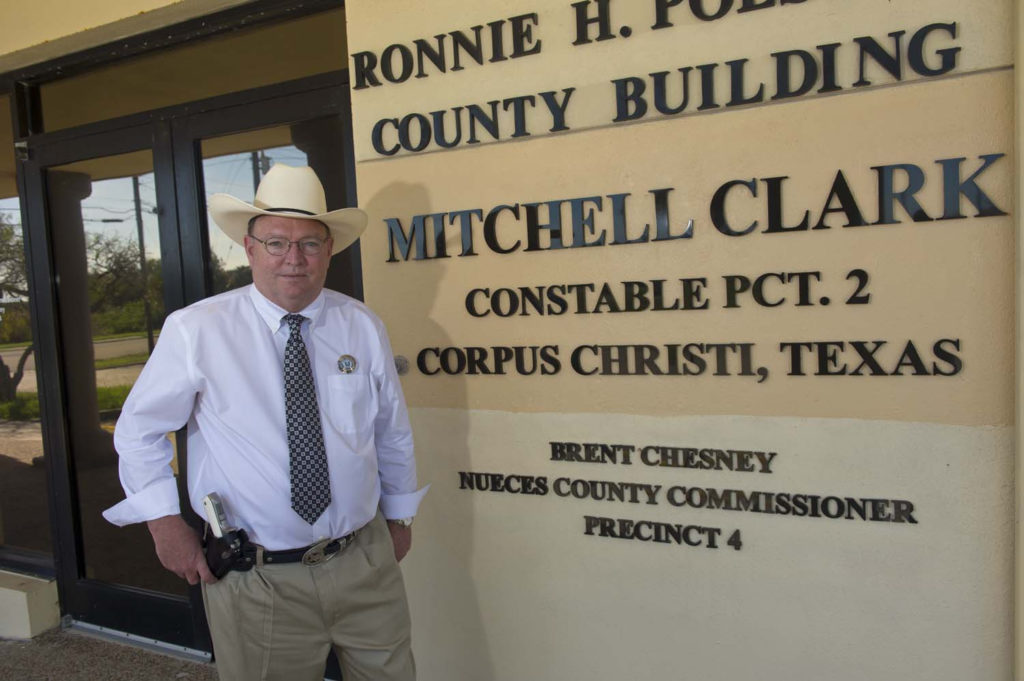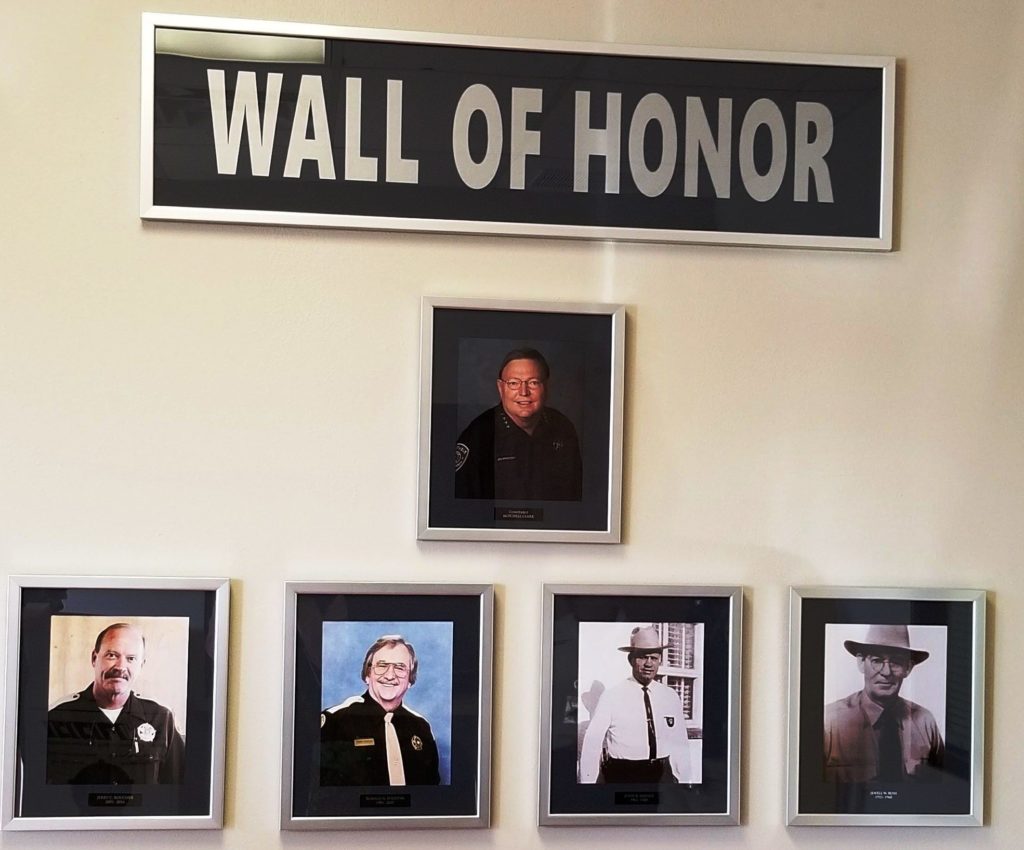
Top: Mitchell Clark; Bottom L to R: Jerry Bouchér, Ronnie Polston, John R. Haynes, Jewell Ross (Photo by Shirley Thornton)
On Tuesday, January 23, 2018, Nueces County Pct. 2 Constable Mitchell Clark unveiled the Wall of Honor, dedicated to all those elected to the office since the precincts inception in 1953. It was an emotional day for many of the family members present at the ceremony for Jewell W. Ross (1953-1960), John R. Haynes (1961-1980), Ronnie Polston (1981-2001), Jerry Bouchér (2001-2016), and Mitchell Clark (2016-present). Family members present included Kathy Ross Hooge, Janet Ross Trammell, Fran Polston, Michael and Anny Parks, Jodie and Joe Alley, Billy and Mary Polston, and Janie (Bouchér) Stobbs. Constable Clark, who initiated the project, said, “The cost of this project was paid for through donations and didn’t cost the taxpayer one cent.”
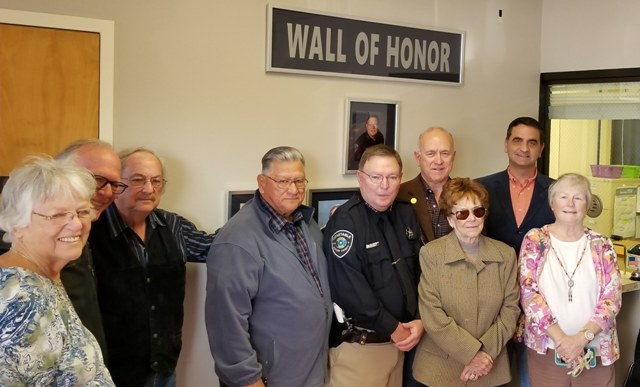
Left to right: Janet Ross Trammell, Rep. Todd Hunter, Ronnie Polston, Commissioner Jack Gonzales, Constable Mitchell Clark, Commissioners Mike Pusley and Brent Chesney, Janie (Bouchér) Stobbs, and Kathy Ross Hooge
Seven months ago, Rachel Krane, Constable Senior Clerk, was charged with the task of doing the research for the project. During that time, she made numerous trips to the library, searched newspaper articles, dug through county archives, and worked with local historians to get the information needed. She was surprised to learn that better records had not been kept for elected officials. Still, she persevered. Krane’s work was instrumental in bringing the project to fruition.
Jewell Ross
In 1952, the Nueces County Commissioners Court shifted Pct. 8 from Driscoll to the area that extended south from Everhart Road, including the University of Corpus Christi on Ward Island, Naval Air Station Corpus Christi, Flour Bluff, and all of Padre Island in Nueces County. Jewell W. Ross was elected constable in November of 1952 and took office as the first constable of the new precinct on January 1, 1953. His opponents were Joseph Henry, Fred Rhome, John O. Winters, William M. Bennett, and Walter Rogers.
Ross quickly went to work building the department. According to an August 19, 1053, Caller-Times article by Mary Gene Kelly, Ross started with a $4000 budget. Soon after, he sought a salary of $3600 for himself and $6000 for his deputies along with a $100 a month car allowance. He also requested office equipment that cost about $435.
In 1954, Ross and his deputies moved into the new $35,000 county building dedicated by County Judge John Young at a ceremony held on June 19, 1954. Flour Bluff School Superintendent E. J. Wranosky served as the master of ceremonies. The Rev. E. McCoy Bynum of Trinity Baptist Church gave the invocation. In attendance were County Commissioners William McKenzie, Horace Caldwell, William J. Bryan, and John J. Sablatura. The Spanish-style structure, located at the entrance of the Padre Island Causeway, housed offices of the justice of the peace and constable of Pct. 8. It also had a courtroom, a two-cell jail, a large waiting room, janitor’s supply room, restrooms, and a parking area for 40 to 45 cars. Along with the building, came a new patrol car and two full-time deputies. Ross would serve as constable of Precinct 8 until his retirement in 1960.
John R. Haynes
The next election pitted A. Z. McIver against John R. Haynes. McIver, who spent eight years with the Corpus Christi Police Department, resigned and began managing White Enterprises. This Baltimore native came to Corpus Christi in 1950 after serving six years in the Navy in WWII. Haynes, also a WWII veteran, was 38 at the time and operated Haynes Bonded Guard Service, serving the Port of Corpus Christi for ten years. Haynes won the election and took office in January of 1961. He would win against McIver again in 1964.
In 1967, he was forced into battle against the county commissioners. Commissioner Robert N. Barnes who led the charge to dissolve the Pct. 7 (Port Aransas) and Pct. 8 (Flour Bluff) constables’ offices. Barnes knew he could not abolish the offices created by the Constitution of the State of Texas, so he moved to simply eliminate their salaries. “Persons still could run for the constables’ offices,” Barnes told a Caller-Times reporter, “but they wouldn’t be paid anything.”
Haynes responded in the same article, “I’m going to take this as high as I can to hold my office. The people out here gave me a vote of confidence that I was doing a good job. They re-elected me with a good majority. I don’t see how the commissioners court can cut an elected man’s salary off.” Haynes would go on to serve the people of Pct. 8 until 1980, sometimes without any deputies, funding, or even an office.
Ronnie Polston
In 1980, Jerry Bouchér, a young opponent who had served as Haynes’s deputy, defeated him in the Democratic primary. However, Boucher would lose the bid for Pct. 8 constable to Republican Ronnie H. Polston, a Vietnam War veteran who was stationed at NAS CC in 1962. Polston finished out his career in Corpus Christi in 1976 when he retired. He went to work for the County Sheriff’s Department, working his way up from jailer to dispatch to patrol and finally to the Criminal Investigation Department. Polston went on to become a sergeant in charge of the Civil Section. It was at this time that he made the decision to run for constable.
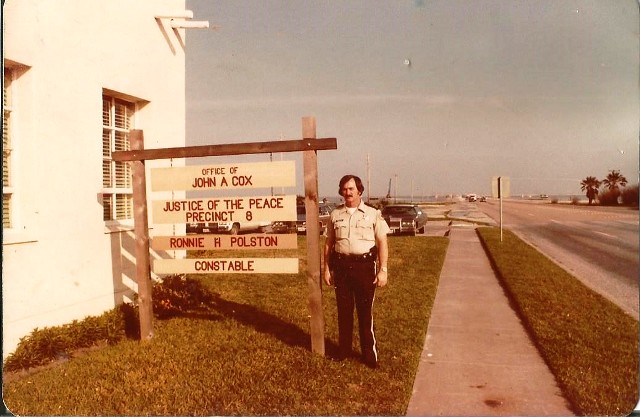
Ronnie Polston outside old building on S. Padre Island Drive, early 1980s (Photo courtesy of Ronnie Polston)
Polston had his work cut out for him when he took office. He was faced with an aging building that needed lots of cleaning, repair, and painting. The department vehicles were also in dire need of maintenance. However, this did not keep Polston from focusing on the job he was elected to do, enforcing the law and tending to the requests of Judge John Cox, the justice of the peace. “My goal was to improve everything at every level,” said Polston. “Money was always an issue, and I just didn’t get everything done that I wanted to get done.” Polston spoke of how difficult it was to get the commissioners to understand that the needs of the Pct. 8 constable were different from those of other precincts. “I needed a vehicle for the island. I couldn’t get one because the commissioners thought they needed to be fair and give all the constables additional vehicles, which they couldn’t afford.”
Polston has fond memories of his days as constable. “I was always available to the public – even if I was at home. My staff and I had a good relationship with the community,” Polston said. He reminisced about how his deputies would volunteer to work the intersection at the school and how they dressed up at Halloween to do it. “Oh, the kids and the parents loved it!” he said. “We really enjoyed going to the schools and talking to the kids. I’d show them things, give them books and stickers, and such, and I’d teach them what a constable does.”
“I never expected the building to be named for me,” said Polston of the new county building where the Wall of Honor is located, “but I was very honored. I loved the Bluff and the job. I thank them for all those wonderful years. It was the highlight of my life.”
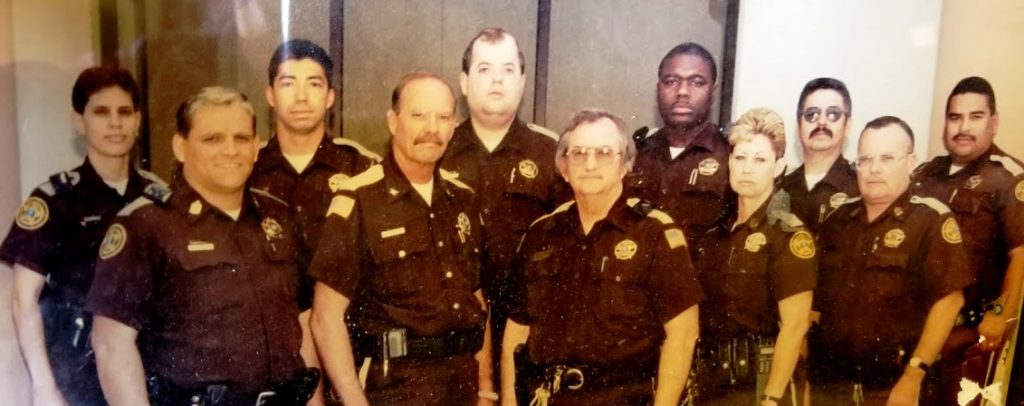
Jerry Bouchér stands next to Constable Ronnie Polston in this Pct. 8 photo provided by Janie Stobbs.
Jerry Boucher
The next man to hold the office was Polston’s Chief Deputy, Jerry Boucher. He graduated Flour Bluff High School in 1970 and went to work as a reserve deputy that same year. “Jerry’s dad was a reserve officer for John Haynes, too” said Janie Stobbs, mother of Boucher. “He couldn’t wait to go to work there. He knew everybody.”
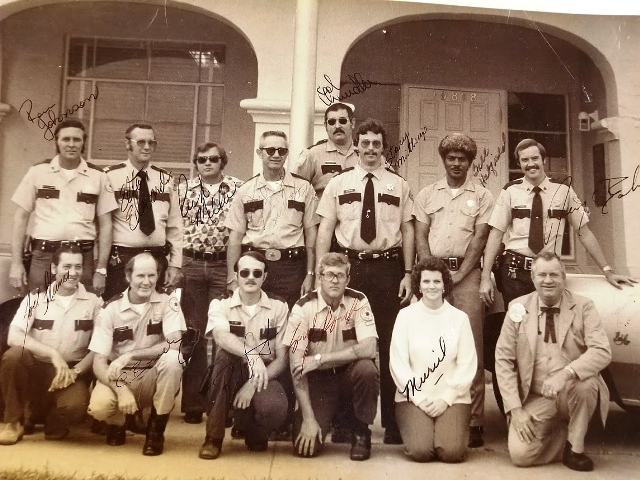
Jerry Bouchér, top row far right, stands behind John R. Haynes kneeling. Bouchér’s father, Charles is front row second from left (Photo courtesy of Janie Stobbs)
“On his own time and with his own money, he took every course at Del Mar on law enforcement and got every kind of training available to him. He even taught classes there himself later in his career,” Stobbs said proudly of her son who passed away in 2016. “He has five letters of recognition and appreciation from five different governors.” Boucher served at Pct. 1 with Johnny Alaniz as Chief.
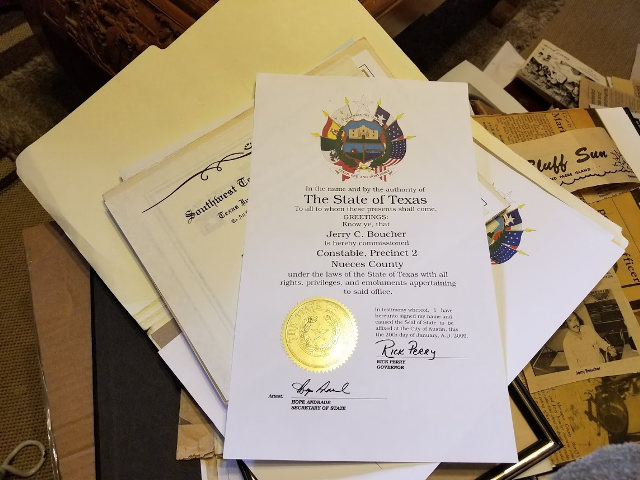
Stobbs’s collection of Bouchér’s training certificates and commendations fill two folders. Boucher even held a ministerial license. (Photo courtesy of Janie Stobbs)
Bouchér, who also studied marine biology and geology at Del Mar, served the Flour Bluff community as the President of the Flour Bluff Civic League. According to a Flour Bluff Sun article, Boucher also served on the Nueces County Employees Credit Union Board of Directors and served as a Red Cross instructor. For a while, he even served as the justice of the peace. Though he was a busy man who was connected to his community in many ways, Boucher believed that the constable should be available 24 hours a day, 7 days a week, a philosophy he shared with his predecessor.
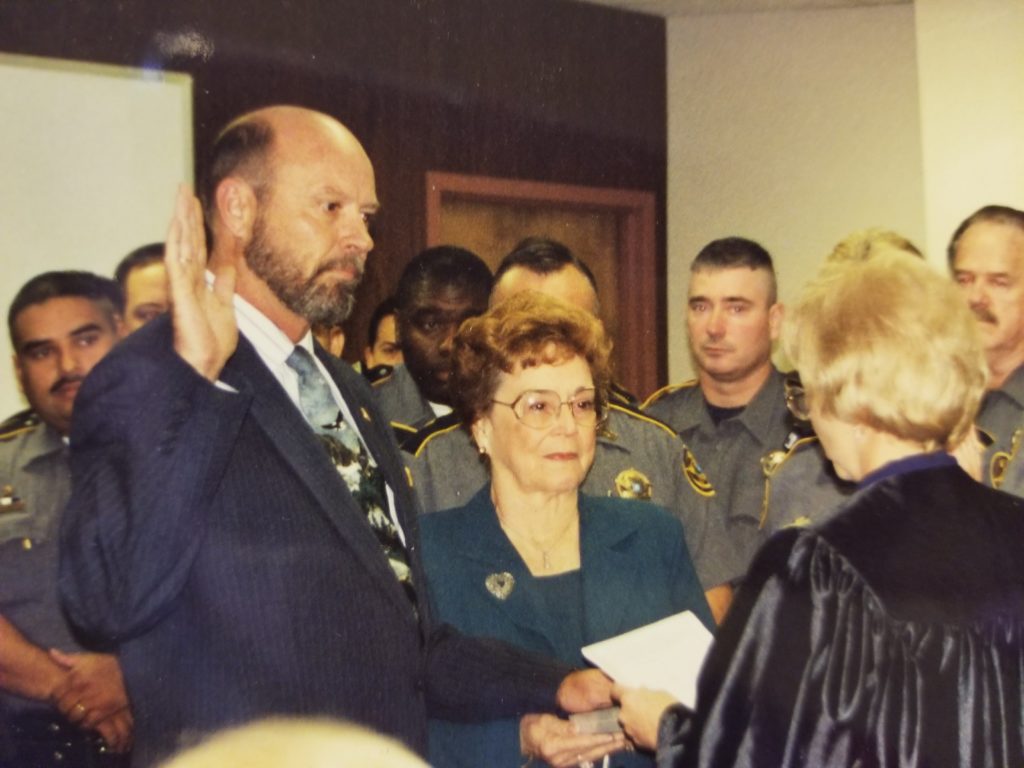
Bouchér with mother, Janie Stobbs at swearing in ceremony with Judge Janice Stoner (Photo courtesy of Janie Stobbs)
“If his men were working, he had them watching out for the kids at Flour Bluff School. He and his men provided traffic control for the Flour Bluff homecoming parades. Jerry even rode in the parade even though he hated being at the center of attention,” said Boucher’s mother. “He always loved Flour Bluff and taking care of the people there.”
Constable Jerry Charles Bouchér, born in Brownsville, in 1952, passed away on Thursday, October 13, 2016. “His heart was in the constable office,” said Stobbs. “We always knew where he was headed and what he wanted.”
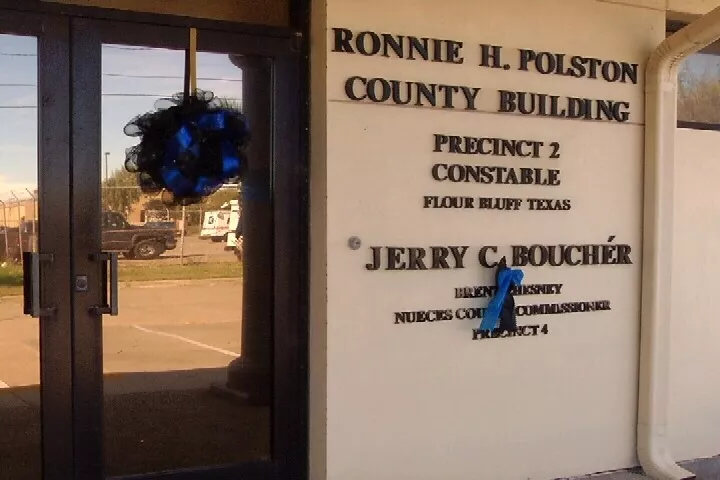
The Ronnie H. Polston County Building, as it looked after Bouchér’s passing. The building bears the geographical location of Flour Bluff, Texas.
Mitchell Clark
When Boucher passed away, his friend of 40 years, Mitchell Clark, was the next man to assume the role of Pct. 2 Constable. Clark ran unopposed in the November 8, 2016, election and was to be sworn in January 1, 2017. However, Boucher’s death in October prompted Judge Loyd Neal to appoint Clark to Bouchér’s remaining term.
A graduate of King High School in Corpus Christi, Constable Clark went on to join the United States Marine Corps. After receiving an honorable discharge, Clark returned to Corpus Christi where he enrolled in college and began his career as a deputy constable. He went to school full time and worked full time as a police officer in the Nueces County Constable operations serving in Precincts, 1, 2, and 8. After graduating Law School and receiving his law license, Constable Clark began a long career as a trial attorney, working on cases across the United States but never forgetting his first love, law enforcement. Constable Clark remained working in the Constable operations on a non-paid basis while practicing law.
According to the Nueces County website, “Constable Clark is committed to providing the citizens of Precinct 2 a safe environment in which to work and live by using technology, equipment and his highly trained officers and administrative staff.” Clark started “Walk with the Constable”, where he meets with the citizens in their neighborhoods, and “Talk with the Constable”, where the Constable uses various social media sights to communicate directly with the citizens in Precinct 2. These programs allow citizens to share concerns with the constable and discuss solutions to problems. Clark is responsible for initiating the Wall of Honor to pay tribute to those who came before him. He told a local television reporter that the Wall of Honor was “a labor of love.”
NOTE: Be sure to visit Texas Shoreline News for more Flour Bluff history and current events.

